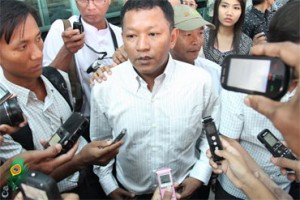22-28 April: Government Uses Political Prisoners as Bargaining Chips Yet Again
April 30, 2013 On 23 April, Burma’s government announced a presidential amnesty for 93 prisoners. Media originally reported that this included 59 political prisoners, however, the Assistance Association for Political Prisoners (AAPP) has confirmed the names of 63 released. Among those released were 40 Shan soldiers, reportedly from the Shan State National Army, and former majority shareholder of the Myanmar Times, Sonny Swe.
On 23 April, Burma’s government announced a presidential amnesty for 93 prisoners. Media originally reported that this included 59 political prisoners, however, the Assistance Association for Political Prisoners (AAPP) has confirmed the names of 63 released. Among those released were 40 Shan soldiers, reportedly from the Shan State National Army, and former majority shareholder of the Myanmar Times, Sonny Swe.
In yet another illustration of the government using political prisoners as bargaining chips, the release happened the day after the European Union decided to lift all sanctions on Burma, except an arms embargo. Previous political prisoner releases also coincided with decisions made by the international community or visits by key international figures, such as US President Barack Obama’s visit last November.
Ko Bo Kyi from AAPP welcomed the amnesty, although he said the government failed to carry out the decision properly: “The release of the political prisoners should be publicly announced. The government should treat them with dignity,” he said. “They are somewhat like bargaining chips, used by the government to gain some achievements” from the international community. AAPP estimates that there are still more than 200 political prisoners.
It is problematic for national reconciliation that the government releases political prisoners without recognizing their status as such, and releases them alongside criminals. Furthermore, as with previous releases, this week’s political prisoners were released conditionally under Section 401 of the Criminal Procedure Code, which states that they can be re-arrested and ordered to serve the remainder of their original sentence for any violation of existing laws. Repressive laws long used to imprison dissidents, such as the Unlawful Associations Act, the Electronics Transactions Act and the State Protection Act, remain on the books. Additionally, lauded new laws, such as the Peaceful Assembly and Peaceful Procession Law, are being used to suppress the activities of activists and curtail freedoms of expression, assembly and association.
Released political prisoners continue to face many challenges after their release. Ko Tun Kyi, a member of the Former Political Prisoner Group, reiterated the need for rehabilitation of political prisoners who have been released, who need help with physical and mental health check-ups, vocational training and financial support. He also called for more civil society organizations to be involved in the rehabilitation of former political prisoners.
Thein Sein’s government must show its commitment to national reconciliation and rectify the situation of political prisoners by acknowledging the past mistreatment of political prisoners in prison and their political status upon release, permitting the verification committee to operate effectively and transparently, releasing all remaining political prisoners, and allowing for appropriate redress, rehabilitation and reintegration.
News Highlights
The European Union decides to lift all sanctions on Burma except for an arms embargo
Inside Burma
Political parties begin to debate voting system for the 2015 general elections
Seven Muslims accused of killing a monk face trial in Meikhtila and a Muslim man in Pegu Region is sentenced to two years in prison for removing an extremist “969” sticker from a shop
Authorities begin census of Rohingyas in Arakan State
Burma Army steps up military campaign in Kachin State, targeting communication lines
Regional
President Thein Sein and Indonesian President Susilo Bambang Yudhoyono agree to boost trade between the two countries while President Yudhoyono expresses concern at recent religious violence
Japanese Prime Minister Shinzo Abe plans to visit Burma in late May for talks with Thein Sein
The Dalai Lama pleads for monks to end violence against Muslims
International
Opinion
Dropping Sanctions and Ignoring Human Rights Abuses
By Mark Farmaner
Democratic Voice of Burma
Are Myanmar’s Hopes Fading?
By Aung Zaw
The New York Times
Fascism is Back in Fashion in Burma
By Kyaw Zwa Moe
The Irrawaddy
Latest from the Blog
Updated RSS Feeds
By Burma Partnership
EU Ignores Its Burma Sanction Benchmarks
By Burma Partnership
Actions
Statements and Press Releases
EU Abandons Burma’s Political Prisoners – Downgrades Human Rights
By Burma Campaign UK
UN Security Council Should Refer Burma to ICC Over Ethnic Cleansing and Crimes Against Humanity Against Rohingya
By Burmese Rohingya Organisation UK
CSW Urges European Union to Prioritise Human Rights in Burma, Despite Lifting Sanctions
By Christian Solidarity Worldwide
EU Council Conclusions on Myanmar/Burma
By Council of the European Union
EU: Ending Sanctions Undercuts Burma’s Rights Progress
By Human Rights Watch
Lifting EU Sanctions Will Unlikely Lead to an Improved Human Rights Situation in Burma
By International Federation for Human Rights and Altsean-Burma
Thein Sein Government Must be Held Accountable for Fresh Burma Army Atrocities in Shan State
By Shan Human Rights Foundation
Reports
Papun Situation Update: Forced labour in Bu Tho Township, January to February 2013
By Karen Human Rights Group
Executive Summary and Recommendations of the Final Report
By Inquiry Commission on the Sectarian Violence in Rakhine State
This post is in: Weekly Highlights









 All posts
All posts